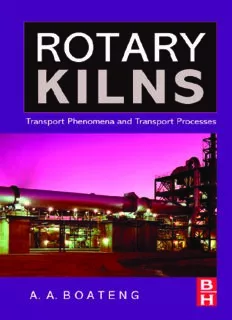
Rotary kilns : transport phenomena and transport processes PDF
Preview Rotary kilns : transport phenomena and transport processes
Rotary Kilns (cid:84)(cid:104)(cid:105)(cid:115)(cid:32)(cid:112)(cid:97)(cid:103)(cid:101)(cid:32)(cid:105)(cid:110)(cid:116)(cid:101)(cid:110)(cid:116)(cid:105)(cid:111)(cid:110)(cid:97)(cid:108)(cid:108)(cid:121)(cid:32)(cid:108)(cid:101)(cid:102)(cid:116)(cid:32)(cid:98)(cid:108)(cid:97)(cid:110)(cid:107) Rotary Kilns Transport Phenomena and Transport Processes Akwasi A. Boateng AMSTERDAM•BOSTON•HEIDELBERG•LONDON NEWYORK•OXFORD•PARIS•SANDIEGO SANFRANCISCO•SINGAPORE•SYDNEY•TOKYO Butterworth-HeinemannisanimprintofElsevier Butterworth-HeinemannisanimprintofElsevier 30CorporateDrive,Suite400,Burlington,MA01803,USA LinacreHouse,JordanHill,OxfordOX28DP,UK Copyright©2008byElsevierInc.Allrightsreserved. Nopartofthispublicationmaybereproduced,storedinaretrievalsystem, ortransmittedinanyformorbyanymeans,electronic,mechanical, photocopying,recording,orotherwise,withoutthepriorwrittenpermission ofthepublisher. PermissionsmaybesoughtdirectlyfromElsevier’sScience&TechnologyRights DepartmentinOxford,UK:phone:(+44)1865843830,fax:(+44)1865853333, E-mail:[email protected] viatheElsevierhomepage(http://elsevier.com),byselecting“Support&Contact” then“CopyrightandPermission”andthen“ObtainingPermissions.” Recognizingtheimportanceofpreservingwhathasbeenwritten,Elsevier printsitsbooksonacid-freepaperwheneverpossible. LibraryofCongressCataloging-in-PublicationData Applicationsubmitted BritishLibraryCataloguing-in-PublicationData AcataloguerecordforthisbookisavailablefromtheBritishLibrary. ISBN:978-0-7506-7877-3 ForinformationonallButterworth-Heinemannpublications visitourWebsiteatwww.books.elsevier.com PrintedintheUnitedStatesofAmerica 08 09 10 11 12 9 8 7 6 5 4 3 2 1 Working together to grow libraries in developing countries www.elsevier.com | www.bookaid.org | www.sabre.org Dedication To my wife, Sita, my number one cheerleader, to the children, and to all the children of the underdeveloped world, particularly in Africa, who, although faced with little or no technological resources, are still motivated and determined to fulfill the dreams of becoming the sci- entists and engineers of tomorrow just as their counterparts in the developed world. v (cid:84)(cid:104)(cid:105)(cid:115)(cid:32)(cid:112)(cid:97)(cid:103)(cid:101)(cid:32)(cid:105)(cid:110)(cid:116)(cid:101)(cid:110)(cid:116)(cid:105)(cid:111)(cid:110)(cid:97)(cid:108)(cid:108)(cid:121)(cid:32)(cid:108)(cid:101)(cid:102)(cid:116)(cid:32)(cid:98)(cid:108)(cid:97)(cid:110)(cid:107) Contents Foreword xv Preface xvii 1 The Rotary Kiln Evolution and Phenomenon 1 1.1 The Rotary Kiln Evolution 1 1.1.1 Comparison of the Rotary Kiln with Other Contactors 4 1.2 Types of Rotary Kilns 7 1.2.1 Wet Kilns 9 1.2.2 Long Dry Kilns 9 1.2.3 Short Dry Kilns 10 1.2.4 Coolers and Dryers 10 1.2.5 Indirect Fired Kilns 12 2 Basic Description of Rotary Kiln Operation 15 2.1 Bed Phenomenon 17 2.2 Geometrical Features and Their Transport Effects 18 2.3 Transverse Bed Motion 19 vii viii Contents 2.4 Experimental Observations of Transverse Flow Behavior 24 2.5 Axial Motion 26 2.6 Dimensionless Residence Time 28 3 Freeboard Aerodynamic Phenomena 33 3.1 Fluid Flow in Pipes: General Background 35 3.2 Basic Equations of Multicomponent Reacting Flows 40 3.3 Development of a Turbulent Jet 43 3.4 Confined Jets 46 3.5 Swirling Jets 48 3.6 Precessing Jets 49 3.7 The Particle-laden Jet 52 3.8 Dust Entrainment 53 3.9 Induced Draft Fan 56 4 Granular Flows in Rotary Kilns 59 4.1 Flow of Granular Materials (Granular Flows) 60 4.2 The Equations of Motion for Granular Flows 64 4.3 Particulate Flow Behavior in Rotary Kilns 67 4.4 Overview of the Observed Flow Behavior in a Rotary Drum 68 4.4.1 Modeling the Granular Flow in the Transverse Plane 72 4.5 Particulate Flow Model in Rotary Kilns 72 4.5.1 Model Description 73 4.5.2 Simplifying Assumptions 74 Contents ix 4.5.3 Governing Equations for Momentum Conservation 75 4.5.4 Integral Equation for Momentum Conservation 79 4.5.5 Solution of the Momentum Equation in the Active Layer of the Bed 83 4.5.6 Velocity Profile in the Active Layer 85 4.5.7 Density and Granular Temperature Profiles 87 4.5.8 An Analytical Expression for the Thickness of the Active Layer 88 4.5.9 Numerical Solution Scheme for the Momentum Equation 90 4.6 Model Results and Validation 92 4.7 Application of the Flow Model 94 5 Mixing and Segregation 101 5.1 Modeling of Particle Mixing and Segregation in Rotary Kilns 105 5.2 Bed Segregation Model 106 5.3 The Governing Equations for Segregation 110 5.4 Boundary Conditions 113 5.5 Solution of the Segregation Equation 114 5.5.1 Strongly Segregating System (Case I) 114 5.5.2 Radial Mixing (Case II) 115 5.5.3 Mixing and Segregation (Case III) 116 5.6 Numerical Solution of the Governing Equations 117 5.7 Validation of the Segregation Model 119 5.8 Application of Segregation Model 120
Description: